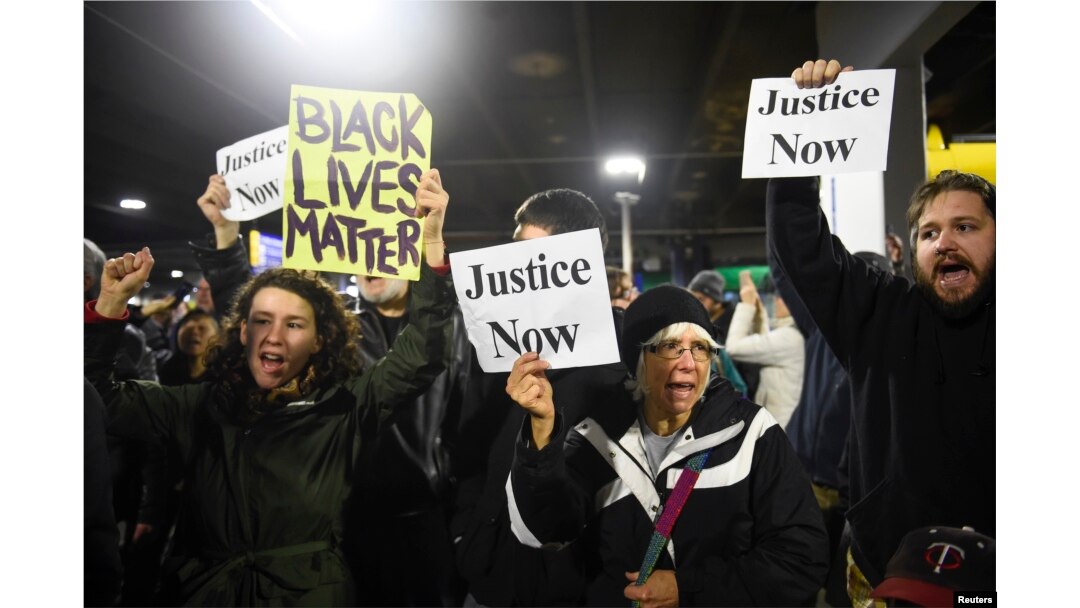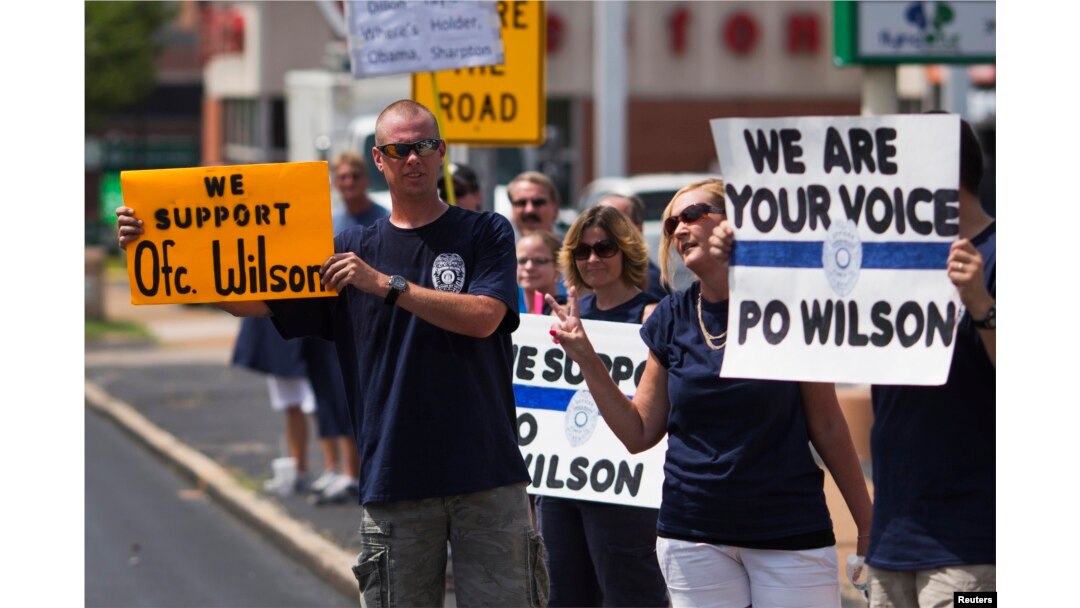Many black residents in Ferguson, Missouri, are still struggling to find ways to trust the police two years after the shooting death here of a black teen by a white police officer and the riots that followed.
"I hope that police would take a different angle, maybe get to know people in the community," said James Thomas, an African-American who lives near Ferguson. "I hope the police would not look at my race and automatically associate it with crime or assume that we are in violation of some kind of law,"
Lezley McSpadden, the mother of shooting victim Michael Brown, 18, can relate to grieving families who lost loved ones in recently deadly encounters with police officers in Baton Rouge, Louisiana, and Falcon Heights, Minnesota. She still cannot accept the officer's actions that took her son's life after a street confrontation.

FILE - Black Lives Matter protesters chant slogans at the Mall of America light rail station in Bloomington, Minnesota, Dec. 23, 2015.
"What he [Officer Darren Wilson] did was disrespectful to the people that honor that [police] uniform and that badge," she said. "He put more than just a city in danger. He put more officers in danger."
Wilson told investigators Brown attacked him and that his life was in danger. A state grand jury and the U.S. Justice Department cleared Wilson of wrongdoing. He resigned from the force in November 2014.
Police misconduct
The shooting in Ferguson galvanized support for the national Black Lives Matter movement and a nationwide debate over police brutality and criminal justice reforms. It also exposed years of police misconduct. According to a March 2015 Justice Department study, blacks made up 67 percent of Ferguson's population but accounted for 93 percent of those arrested from 2012 to 2014.

FILE - Supporters of Officer Darren Wilson hold posters outside Barney's Sports Pub in St. Louis, Missouri, Aug. 23, 2014.
When Brown was shot, the police department had 50 white officers and only three blacks.
"There is always a tension and an uneasiness, and uncertainty around the interaction and the relational nature of individuals, and the police understanding. It is not isolated to merely Ferguson," said the Reverend Willis Johnson, a community activist.
The Justice Department investigation found the mostly white Ferguson Police Department had systematically engaged in racial profiling and excessive use of force, and it mandated reform.
"We have worked really hard to try to change the perception of how we do policing here in Ferguson," said De Carlon Seewood, Ferguson's city manager. Seewood replaced former City Manager John Shaw, who resigned after the federal report highlighted racial profiling among Ferguson police.
"You are not going to fix years and years of issues in a single gunshot," Seewood said. "It is going to take a long, drawn-out process. It is going to take being diligent and make sure we are standing behind the processes and procedures we are putting in place."
Police reforms
The Ferguson Police Department has a new black police chief, Delrish Moss. It is also required to institute a new officer training program.
Some in the community are skeptical.
"It is the same officers. They have not been retrained," said Ferguson resident Emily Davis, a member of a citizens group called the Ferguson Collaborative. "They do not have a good understanding of what community policing would look like, because they are not receiving that training."
FILE - The Ferguson Police Department has a new black police chief, Delrish Moss, pictured May 9, 2016. It is also required to implement a new officer training program.
Moss said there's no magic pill for curing the city's problems, but he said he had issued this warning to officers: "If you work hard, stay honest and maintain respect for your community, we will get along just fine. If you make a mistake and do it with malice in a way that disrespects the badge that you hold, I will see to it that [you are] removed from police service or further prosecuted."
The Ferguson Police Department is one of several under federal mandate to carry out reforms. In Albuquerque, New Mexico, the police department faced scrutiny for a high rate of shootings by police from 2010 to 2014.
In a report this month, court-appointed monitor James Ginger suggested Albuquerque's police struggled to adequately investigate use-of-force cases and failed to hold officers accountable. However, the department showed improvement in de-escalating standoffs and other high-stress situations, the report said.
In Ferguson, some residents are calling for more community involvement in pressuring city officials to carry out Justice Department mandates for police departments.
"The citizens have to take on the responsibility of making sure that those agreements are enforced," said Francesca Griffin, a member of the Ferguson Collaborative, "and we do that by protesting, by bringing to light things that we see that are not supposed to be."
African-Americans in Ferguson say reform at the police department will start when officers serve the community with respect and fairness.

